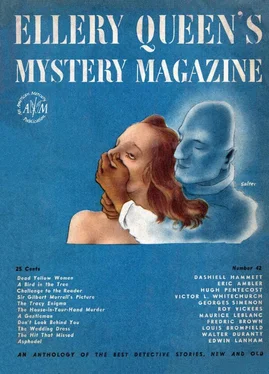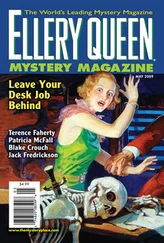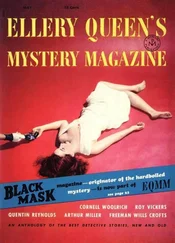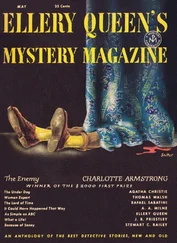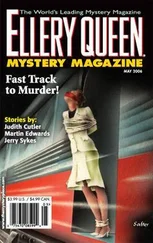Эрик Эмблер - Ellery Queen’s Mystery Magazine. Vol. 9, No. 42, May 1947
Здесь есть возможность читать онлайн «Эрик Эмблер - Ellery Queen’s Mystery Magazine. Vol. 9, No. 42, May 1947» весь текст электронной книги совершенно бесплатно (целиком полную версию без сокращений). В некоторых случаях можно слушать аудио, скачать через торрент в формате fb2 и присутствует краткое содержание. Город: New York, Год выпуска: 1947, Издательство: The American Mercury, Жанр: Классический детектив, Детектив, на английском языке. Описание произведения, (предисловие) а так же отзывы посетителей доступны на портале библиотеки ЛибКат.
- Название:Ellery Queen’s Mystery Magazine. Vol. 9, No. 42, May 1947
- Автор:
- Издательство:The American Mercury
- Жанр:
- Год:1947
- Город:New York
- ISBN:нет данных
- Рейтинг книги:3 / 5. Голосов: 1
-
Избранное:Добавить в избранное
- Отзывы:
-
Ваша оценка:
- 60
- 1
- 2
- 3
- 4
- 5
Ellery Queen’s Mystery Magazine. Vol. 9, No. 42, May 1947: краткое содержание, описание и аннотация
Предлагаем к чтению аннотацию, описание, краткое содержание или предисловие (зависит от того, что написал сам автор книги «Ellery Queen’s Mystery Magazine. Vol. 9, No. 42, May 1947»). Если вы не нашли необходимую информацию о книге — напишите в комментариях, мы постараемся отыскать её.
Ellery Queen’s Mystery Magazine. Vol. 9, No. 42, May 1947 — читать онлайн бесплатно полную книгу (весь текст) целиком
Ниже представлен текст книги, разбитый по страницам. Система сохранения места последней прочитанной страницы, позволяет с удобством читать онлайн бесплатно книгу «Ellery Queen’s Mystery Magazine. Vol. 9, No. 42, May 1947», без необходимости каждый раз заново искать на чём Вы остановились. Поставьте закладку, и сможете в любой момент перейти на страницу, на которой закончили чтение.
Интервал:
Закладка:
Before he married her he had known her nature was secretive, but he had thought it due to recent widowhood and to the engaging vagueness that artists seemed to have when not in the consuming concentration of their work. Now he knew that he had never understood this restrained, silent woman, nor the secret melancholy in her eyes that had first attracted him.
The first six months of marriage were, of course, the months and days and hours of knowing each other, of exploring character and emotion, and naturally there was a certain holding back, particularly in a woman who had suffered emotional shock.
But hers was such an instinctive, feminine manner of evasion that Edward had thought it entirely natural until that day in the small bar off Fifth Avenue when she had told him that she had been married twice — not once — before. It was an odd thing, he thought, that the only frank conversations he had with his wife were in public, over a cocktail.
That day he had said stiffly. “I wonder you didn’t tell me before. Not that it makes any difference, darling. But, still!”
Her cheeks had been pink and her eyes bright as needles. “Do you mind very much, Edward?”
“I don’t mind. But, darling, after all.” He had turned his glass in a little puddle of spilled drink. “Who was he? What was his name?”
“George Partland. He was rather stuffy.” Her laughter had been quick and so high that the noise seemed to make the glasses rattle on the bar. “Let’s don’t talk about poor George.”
He had said bitterly, “So you’re Mrs. Partland Rice Peters?”
It was unkind, and he remembered how abruptly the laughter had ceased, how the gray eyes had darkened as she said, “I shouldn’t have told you.”
He had tried to say that a man in love must know everything, every small experience and major suffering. A man in love had a relentless desire to know these things, he’d wanted to say, even if they hurt him. Instead he’d called the waiter and paid the check.
Edward had resolved to confine George Partland to the pigeonhole reserved in his ordered lawyer’s mind for the things he wanted to know but had no answer for.
Her age, for instance. She had told him she was thirty-one. Not that he cared, but she was young to have two marriages behind her and a successful career as a sculptor assured. And there were other things he wanted to know: her background, her schooling. She was an orphan, she had said. He did not even know the name of the town where she was born.
“Edward, please!” Elaine said sharply. “Your head is drooping.”
He straightened, fixed his eyes again on the high light of the bronze faun. His head ached steadily, and the crispness of her tone annoyed him and made him remember the day when he had asked her about her first husband, in spite of his resolve.
“Edward, you have no right to be jealous of my past,” she had said firmly. “Least of all of Larry.”
“But it isn’t jealousy,” he had protested. “What was that? Larry! I thought you said his name was George.”
For an instant she had actually met his eyes that day, and in their gray depths he’d seen a somber sadness. Her underlip had trembled noticeably.
“Good Lord,” he had said. “How many husbands have you had, Elaine?”
Her eyes downcast again, she had waited a long moment, as if pondering whether to give him an answer at all. Then her voice had come, low but steady, “If you must know, four.”
“Four?” Edward had dropped into a chair, staring up at her. He had tried a short laugh and accomplished a strange disturbing sound. He had asked, “You mean counting me?”
Again the hesitation, the low voice, “Not counting you, Edward.”
“But this is grotesque” was all Edward had been able to say, then he had lost his temper and said many things, while she had stood tensely by the fireplace, with one elbow resting on the mantel, watching him. The expression of her eyes had been the impersonal, appraising expression that was in her eyes now as she worked on his bust. When he quieted he had asked, “I know Rice died, but what happened to the others? Divorced?”
“No, Edward.”
He remembered the calm assurance of her tone, and it occurred to him now for the first time that she had met his eyes throughout the incident. She had never looked away, once she had told him there were four.
“They’re dead, Edward,” she had said flatly.
“All four? All four died on your hands?” he had exclaimed.
Thinking of it, Edward’s heart seemed now to rustle like autumn leaves and her answer still was brittle in his ears: “I should think, Edward, you’d be more considerate. It isn’t fair to cross-examine me about things past. I’ve had my share of misfortune and I’d like to forget it.”
“But look here, Elaine, I’m your husband,” he had said. “We were married to share our lives, not just a part of them. Marriage is a contract and all the facts should be set forth, all the...”
“You’re talking like a lawyer.” She had waved one hand impatiently. “Oh, Edward, you know you’d have been even more upset if I’d told you in the beginning. I didn’t tell you simply because I knew you’d mind.”
“Well, I do mind,” he’d said. “I mind like hell. I don’t mean about George and Larry and whoever else. I mean, damn it, you should have told me. You shouldn’t have kept it from me.”
But later he had softened. He’d been sympathetic and, holding her hand, had said, “Darling, you’ve had a lot of bad luck, I know. I suppose I can understand your being secretive about it, but please, let’s have no more of it. Let’s tell each other everything. What do you say? No more secrets.”
She had clung to him then and sobbed and whispered, “No more secrets, darling,” and the next few days had been the best of their marriage. But he had been unable to get those four out of his head. He had known that it was pointless to ask about them, but he could not keep them out of his thoughts. After all — four husbands! He had begun to form mental pictures of them, to assign physical characteristics and character traits.
The last one, that man Rice, he knew about. Elaine had met him out on the Coast, been his wife about a year. It was heart disease that had taken Rice, he remembered. Then there was George, who was stuffy. Edward conceived of George as a large man with a prominent chin and rather choking high collars. She had passed Larry off rather casually. But what was his last name? And who in blazes was the other fellow, the one somewhere in between?
It was the one between, the man without a name, who troubled Edward most. Several times he had been on the point of asking about him, but he had not dared return to those bitter days of distrust and evasion. Often he had tried to lead the discussion around to the subject, such as the time they’d been to a cocktail party downtown and had stopped for one more at the Brevoort on a fine spring day when the hedges were set out and sunlight fell on the tables.
“Darling,” he had said after the second Manhattan, “where were you born?”
“Where? In a hospital, I suppose. What difference does it make?”
“I mean what part of the country? What town?”
“I haven’t any idea, Edward. You know I’m an orphan.”
“But you know who your parents were, don’t you?”
“Just their names.”
“Then where were you brought up? In a foundling home?”
“Edward, are you going to pry again? Please. I had rather a rough childhood and I’d rather not talk about it.”
“All right,” he had said. “Sorry, Elaine.”
But it did seem, he had thought, that she would know her home town. It couldn’t be far from the foundling home. It would be in the same state, certainly. She must know the state.
Читать дальшеИнтервал:
Закладка:
Похожие книги на «Ellery Queen’s Mystery Magazine. Vol. 9, No. 42, May 1947»
Представляем Вашему вниманию похожие книги на «Ellery Queen’s Mystery Magazine. Vol. 9, No. 42, May 1947» списком для выбора. Мы отобрали схожую по названию и смыслу литературу в надежде предоставить читателям больше вариантов отыскать новые, интересные, ещё непрочитанные произведения.
Обсуждение, отзывы о книге «Ellery Queen’s Mystery Magazine. Vol. 9, No. 42, May 1947» и просто собственные мнения читателей. Оставьте ваши комментарии, напишите, что Вы думаете о произведении, его смысле или главных героях. Укажите что конкретно понравилось, а что нет, и почему Вы так считаете.
